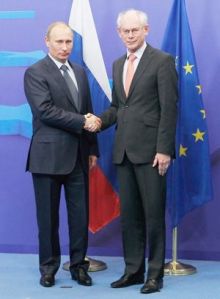Moscow – Experts are worried that as a result of the situation in the Middle East the oil prices may exceed 220 dollars a barrel. But will it help Russia? What happens in the planet’s main oil producing region can seriously impact the global economy. Already during the last week of February oil prices rose to 118 dollars a barrel. According to international experts, if the unstable situation persists or worsens in a number of leading OPEC member countries located in the Middle East, then prices for “black gold” may even exceed 220 dollars a barrel. Rus-sian Prime Minister Vladimir Putin reminded during his visit to Brussels on February 24 what this can mean for the world economy. I would like to highlight that in this case it is not so much what obvious facts were recognized, but who re-cognized them.
Thus, after finishing negotiations with the European Commission, during the press conference Putin mentioned an abrupt oil price increase among the probable consequences of the Middle East crisis. This, of course, could hardly surprise anyone in the audience. However, the commentary of the head of the Russian government, about how high oil prices are not beneficial to anyone, including Russia, was more surprising. The reason: the narrowing of the world economy as a result of the “oil shock” will inevitably influence Russia as one of the main suppliers of raw material and semi-finished products.
Well, it’s hard to disagree with the last statement. In fact, the next day, in connection with the opening of the Year of Spain in Russia and the meeting of President Medvedev and Premier Putin with the Spanish royal spouse, it was mentioned in passing that in terms of Russia’s exports to Spain, 90 percent (!) consists of oil, oil products and metals. The same is true of Russia’s trade with many other major economies.
Thus, extremely high oil prices will inevitably lead to a decrease of oil usage by leading countries, and consequently a decline in Russian exports. And then there will be a chain reaction: drop in income from oil exports — the main source of budget revenues, will lead to different problems, from solely economic to social-political ones. Certainly, this perspective would look like a catastrophe for today’s Russia with its over-dependence on oil production and export of raw materials. However, let us repeat, this is possible only if prices for “black gold” become really too high. But what will happen if they grow considerably but not too much?
If oil prices oscillate within the range of 110 to 120 dollars a barrel, Russia, or more precisely, its ruling elite, will be able to painlessly return to the pre-crisis situation. In fact, there will be no budget deficit and it will be possible to accumulate the so-called additional profits in the Reserve Fund. This in turn means that it will be possible to make one-off social payments to parts of the populace, and just before the elections! And there will be no need to change anything in the stagnating colonial structure of the economy — no modernization will be needed.
One might say that I am biased, that Russian authorities are determined to act in favor of modernization and decrease the economy’s dependence on raw materials. Of course! If it were so, why would Premier Putin started talking about his favorite topic of increasing energy supplies to Europe during the press conference in Brussels? “If the Nord and South streams worked already,” he stated, “there would be fewer risks for Europe (as a result of events in the Middle East! – Author).”
What a Freudian slip! It’s not even a slip but an entire program outline. It confirms that in their heads, Russian leaders will continue to bet on oil and gas resources, as a basis for domestic and foreign policy. No need to remind that one of the political purposes of the abovementioned energy channels is to “weaken dependence” on Ukraine and Belarus as oil and gas transit countries. That makes it possible to take them less into account, and thus demand more.
Basically the Russian premier admitted: his country, as before, connects its political ambitions with oil and gas. While they have it. While they have it? What will happen when they are exhausted? Did anyone seriously consider such a course of events?
Yes they did, as it turns out, even on a rather high level, as is confirmed not by some oppositional source, but the official Rossiyskaya gazeta. Though it did not appear on the first pages, information was published about a meeting of the Security Council of Russia held on December 13, 2010, where, officially, it was stated: the oil deposits are exhausted by more than half, and the Ministry of Energy of the Rus-sian Federation doesn’t expect the opening of big new oil projects within the next ten years. This, in its turn, means that in a few dozen years it will become unprofitable to produce the previous amount of oil, and gas, given Russia’s current technological level. Since one can see no technical and technological breakthrough coming, one can come to the final conclusion: Russia will only have enough oil and gas for its internal use, and its export capabilities will be exhausted.
Thus, it’s time to speak not about the future use of the Nord, South and other streams as a means of political pressure on neighbors, and not about the manipulation of oil and gas prices as geopolitical weapons, but about whether in 20 years Russia will remain among the exporters of these raw materials! Correspondingly, it’s time for Ukraine and Belarus to think about serious long-term plans of gradual replacing such an unreliable supplier of energy resources, inclined to live only for The Day, by a more reliable and re-putable one, whose hydrocarbons deposits are not limited by thoughtless squandering, and whose plans are not restricted by the nearest elections.







